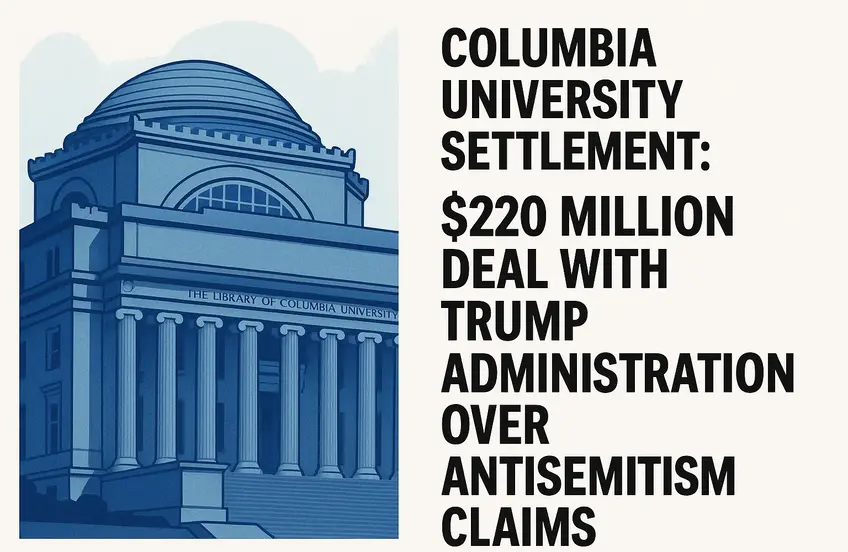In a landmark agreement that could set a precedent for higher education institutions across the country, Columbia University has reached a massive Columbia University settlement with the Trump administration, agreeing to pay $220 million over the next three years. This historic deal resolves civil rights investigations into allegations that the Ivy League institution failed to protect Jewish students from antisemitism on campus.
The Columbia University Settlement: Breaking Down the $220 Million Deal
The Columbia University settlement represents one of the largest financial penalties ever imposed on a university for civil rights violations. The agreement comes after months of intense negotiations between Columbia’s leadership and the Trump administration, following chaotic campus protests that erupted throughout the past year.
Columbia University settlement details reveal that the $220 million payment will be distributed over three years, with the university making significant concessions to restore federal funding that was suspended in March. This settlement not only addresses immediate financial concerns but also establishes new protocols for campus safety and student protection.
Key Terms of the Columbia University Settlement
The comprehensive Columbia University settlement includes several critical provisions:
- $220 million payment over three years to resolve civil rights investigations
- Restoration of federal funding that was suspended in March
- Handover of hiring and admissions data to federal authorities
- Ban on masked protests on campus
- Enhanced campus security measures
- Cooperation with NYPD for law enforcement matters
Background: The Antisemitism Investigation That Led to the Columbia University Settlement
The Columbia University settlement stems from a series of civil rights investigations launched by the Trump administration, which accused the university of turning a blind eye to antisemitism on campus during months of protests.
Timeline of Events Leading to the Columbia University Settlement
The path to the Columbia University settlement began with:
- Campus Protests: Chaotic demonstrations that broke out over the past year
- Federal Investigation: Trump administration launched civil rights probes
- Funding Suspension: Federal funding was cut off in March
- Negotiations: Months of back-and-forth discussions
- Settlement Agreement: Final deal reached with significant concessions
The Trump Administration’s Position
According to the Trump administration, the Columbia University settlement was necessary because:
- Failure to Protect Students: The university allegedly failed to protect Jewish students
- Civil Rights Violations: Multiple investigations found evidence of discrimination
- Campus Safety Concerns: Protests created an unsafe environment
- Federal Funding Accountability: Taxpayer dollars require proper oversight
Financial Impact of the Columbia University Settlement
The Columbia University settlement has significant financial implications for both the university and potentially other institutions facing similar investigations.
Immediate Financial Consequences
The $220 million Columbia University settlement represents:
- Largest Penalty: One of the biggest civil rights settlements in higher education history
- Three-Year Payment Plan: Structured to minimize immediate financial strain
- Federal Funding Restoration: Critical for ongoing university operations
- Precedent Setting: May influence future settlements with other institutions
Long-term Financial Implications
The Columbia University settlement could affect:
- Tuition Costs: Potential impact on student fees and expenses
- Endowment Management: How the university manages its financial resources
- Fundraising Efforts: Need to replenish funds used for settlement
- Budget Priorities: Reallocation of resources to meet settlement obligations
Campus Policy Changes Under the Columbia University Settlement
The Columbia University settlement includes significant changes to campus policies and procedures, designed to prevent future civil rights violations.
New Security Measures
As part of the Columbia University settlement, the university must implement:
- Enhanced Campus Security: Additional safety personnel and monitoring
- NYPD Cooperation: Direct collaboration with local law enforcement
- Protest Regulations: Stricter guidelines for campus demonstrations
- Student Protection Protocols: Enhanced measures to protect vulnerable students
Administrative Changes
The Columbia University settlement requires:
- Data Transparency: Sharing hiring and admissions information with federal authorities
- Policy Revisions: Updated codes of conduct and disciplinary procedures
- Training Programs: Enhanced staff and student education on civil rights
- Monitoring Systems: Regular reporting on campus climate and incidents
Columbia’s Response to the Columbia University Settlement
University leadership has provided a measured response to the Columbia University settlement, acknowledging the challenges while maintaining their position on certain issues.
Official University Statement
Columbia’s acting president has stated that:
- No Admission of Wrongdoing: The university did not admit to wrongdoing as part of the settlement
- Acknowledgment of Challenges: Recognition of “serious and painful challenges” faced by the institution
- Commitment to Improvement: Pledge to address antisemitism and campus safety
- Focus on Students: Priority on ensuring student safety and well-being
Student and Faculty Reactions
The Columbia University settlement has generated mixed reactions:
- Relief: Many students feel safer with enhanced security measures
- Concerns: Some faculty worry about academic freedom implications
- Optimism: Hope that the settlement will improve campus climate
- Questions: Uncertainty about long-term impact on university culture
Hiring?
Post jobs for free with WhatJobs — and find professionals who understand higher education compliance and civil rights law. Whether you’re hiring university administrators, legal experts, or policy-focused compliance specialists, we connect you with candidates ready to navigate complex regulatory environments.
Post a Job Now →Broader Implications: The Columbia University Settlement as a Blueprint
The Columbia University settlement is being closely watched by other institutions, particularly those facing similar investigations or potential civil rights violations.
Impact on Other Universities
The Columbia University settlement may serve as a template for:
- Harvard University: Currently negotiating with the White House
- Other Ivy League Schools: May face similar scrutiny and pressure
- Public Universities: Could be subject to similar federal oversight
- Private Institutions: May need to review their policies and procedures
Federal Policy Implications
The Columbia University settlement suggests:
- Increased Federal Oversight: More aggressive monitoring of higher education
- Civil Rights Enforcement: Stricter enforcement of anti-discrimination laws
- Funding Accountability: Greater scrutiny of federal funding recipients
- Precedent Setting: Establishes framework for future settlements
Legal and Regulatory Context of the Columbia University Settlement
The Columbia University settlement operates within a broader legal framework governing civil rights and federal funding in higher education.
Civil Rights Law Framework
The Columbia University settlement is based on:
- Title VI of Civil Rights Act: Prohibits discrimination in federally funded programs
- Department of Education Regulations: Governing campus safety and student protection
- Federal Funding Requirements: Conditions for receiving taxpayer dollars
- Due Process Protections: Rights of institutions and individuals
Regulatory Compliance
The Columbia University settlement addresses:
- Federal Reporting Requirements: Enhanced transparency and accountability
- Campus Safety Standards: Minimum requirements for student protection
- Discrimination Prevention: Measures to prevent civil rights violations
- Monitoring and Enforcement: Ongoing oversight and compliance verification
Economic and Educational Impact of the Columbia University Settlement
The Columbia University settlement has broader implications for the economics of higher education and the educational experience of students.
Economic Considerations
The Columbia University settlement affects:
- University Finances: Significant financial burden and resource allocation
- Student Costs: Potential impact on tuition and fees
- Endowment Management: How the university manages its financial resources
- Competitive Position: Impact on Columbia’s standing among peer institutions
Educational Implications
The Columbia University settlement influences:
- Campus Climate: Changes in student and faculty interactions
- Academic Freedom: Balance between safety and intellectual discourse
- Student Experience: Impact on learning environment and campus life
- Institutional Culture: Long-term changes in university values and practices
Future Monitoring and Compliance Under the Columbia University Settlement
The Columbia University settlement includes ongoing requirements for monitoring, reporting, and compliance verification.
Compliance Requirements
The Columbia University settlement mandates:
- Regular Reporting: Periodic updates to federal authorities
- Data Sharing: Continued transparency in hiring and admissions
- Policy Implementation: Verification of new security and safety measures
- Progress Monitoring: Assessment of campus climate improvements
Success Metrics
The Columbia University settlement will be evaluated based on:
- Incident Reduction: Decrease in antisemitism and discrimination reports
- Student Safety: Improved protection of vulnerable student populations
- Campus Climate: Enhanced environment for all students
- Policy Effectiveness: Successful implementation of new measures
Conclusion: The Columbia University Settlement’s Broader Significance
The Columbia University settlement represents a watershed moment in higher education, establishing new standards for federal oversight and institutional accountability.
Key Takeaways from the Columbia University Settlement
- Federal Oversight: Increased government scrutiny of higher education institutions
- Financial Accountability: Significant financial consequences for civil rights violations
- Policy Changes: Mandatory implementation of enhanced safety and security measures
- Precedent Setting: Framework for future settlements with other universities
- Student Protection: Renewed focus on protecting vulnerable student populations
Looking Ahead
The Columbia University settlement suggests several trends to monitor:
- Other University Settlements: Potential similar agreements with Harvard and other institutions
- Federal Policy Changes: Possible new regulations or enforcement priorities
- Campus Safety Standards: Evolution of minimum requirements for student protection
- Institutional Accountability: Enhanced transparency and reporting requirements
- Student Rights: Balance between safety measures and academic freedom
As the higher education landscape continues to evolve, the Columbia University settlement serves as a reminder of the complex balance between institutional autonomy and federal oversight. Success will require ongoing collaboration between universities, government agencies, and student communities to ensure safe, inclusive, and academically rigorous environments.
FAQ Section
What is the Columbia University settlement and why is it significant?
The Columbia University settlement is a $220 million agreement between Columbia University and the Trump administration to resolve civil rights investigations into antisemitism on campus. It’s significant because it represents one of the largest financial penalties ever imposed on a university for civil rights violations and may serve as a blueprint for other institutions.
How does the Columbia University settlement affect students and faculty?
The Columbia University settlement affects students and faculty by implementing new security measures, banning masked protests, enhancing campus safety protocols, and requiring greater transparency in university operations. While these changes aim to protect students, some faculty have expressed concerns about potential impacts on academic freedom.
What are the key terms of the Columbia University settlement?
Key terms of the Columbia University settlement include a $220 million payment over three years, restoration of federal funding, handover of hiring and admissions data, ban on masked protests, enhanced campus security, and cooperation with NYPD. The university did not admit to wrongdoing but acknowledged serious challenges.
How might the Columbia University settlement impact other universities?
The Columbia University settlement may impact other universities by serving as a precedent for similar agreements, particularly with Harvard University which is currently negotiating with the White House. It could lead to increased federal oversight and stricter enforcement of civil rights laws across higher education institutions.




